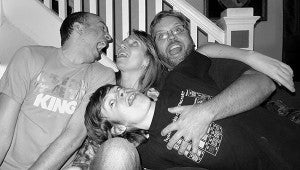Parents cope with hurdles while raising autistic children
Published 7:00 am Saturday, April 19, 2014

CLOWNING AROUND: A diagnosis of autism does not have to rob a family of joy. With a strategy that includes coping skills, humor and understanding, a family can be reap many rewards.
Photo submitted
(This is the second in a series of weekly stories covering autism in recognition of Autism Awareness Month)
By Jodi Marze
Picayune Item
The Chylinski family discovered their second son might have autism right before his third birthday.
“It was at a regular pediatrician appointment as we were discussing milestones, that the Dr. recommended we make Noah an appointment with a neurologist,” Michelle Chylinski said. “He wasn’t eating well, he wasn’t speaking, and he was extra clingy.”
Noah was diagnosed with autism at the neurology appointment.
The family immediately sought a second opinion because they needed reassurance.
“The second time, we went to the Children’s Hospital in Pittsburgh,” Chylinski said. “We felt like they helped arm us with information to help him instead of focusing on how to change him.”
The hospital helped the family form a strategy of coping and understanding. They helped the family realize Noah would always need extra directions, explanations and extra help, Michelle Chylinski said.
Now a teenager, Noah is highly functioning, so others may not even notice that he has autism unless they have experience with autism.
Challenges have ranged from Noah’s unexpected outbursts to his rejection of what would be considered a normal activity or engagement.
“When he was little there were very long time periods when he would freak out when I bathed him. He was very afraid of the water for no reason. So there were times when he would scream while I bathed him and I would cry with him,” Chylinski said.
Noah has “sensory defensiveness” where certain textures are extremely uncomfortable. He didn’t like to touch grass or sand with his bare feet. He didn’t like the way certain foods felt in his mouth. He would experience more than the normal pain or irritation from textures, she said.
Communication is a challenge on a normal day, but when dealing with someone who has autism, you have to give additional directions and explanations, she said.
“There was no time I could just say go to the kitchen and get me a spoon,” Chylinski said. “I would need to say, ‘Go into the kitchen to top drawer, right next to the stove, and open it up and bring me a spoon.”
Connecting with people is a challenge, but Chylinski said Noah is doing better. He still has trouble with relating to others and how he perceives situations and things.
Instead of describing a board game by the name or objective, Noah begins his description with a background color.
Armed with well-researched coping mechanisms for both themselves and Noah, the family leans on each other.
“We have to remind each other sometimes that Noah’s reaction or non-responsiveness to us is not based on his personal feelings. At times like that, we just have to remind each other to change our approach,” Chylinski said.
For parents who have children or loved ones with autism, Chylinski said to focus on coping instead of trying to change them.
“You may change how they adapt and react but the autism is not going to go away. Even if I could cure it, I would not to change who he is. I want to help him, not make him different. I want to encourage him but not push him to contradict who he is.”
While Noah faces many challenges, he is very talented in computer coding and playing music by ear.
“He can make it snow in his video games and write code to do all kinds of things on our computer. One time he made hearts with ‘I love you mom’ in the center of them. He can also hear something once by recording and tell me what has changed when he hears it performed live,” she said. “He is amazing and we are blessed to have him in our family.”


